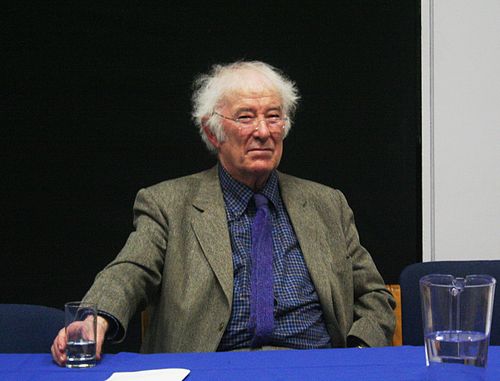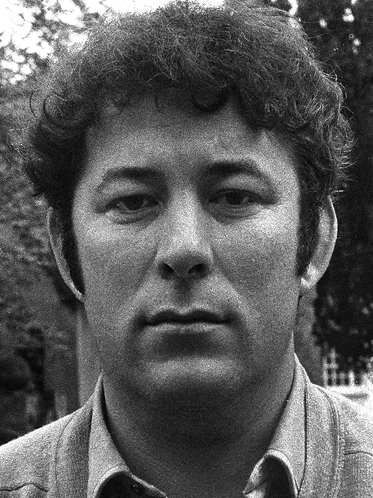|
|
|||
|
One of the greatest poets we’ve ever known died Friday morning, August 30, in Dublin, at the age of 74. The news arrived just after breakfast, in the form of an email from a mutual friend. I was shocked and saddened and angry. I knew, since Seamus had suffered a stroke in August, 2006, that he’d been plagued by ill health. But somehow I expected he’d go on and on. After all, he certainly lived inside my head. I carried inside of me his poems, his broad face, his smile, his generosity, his intense warmth, his mischievous eyes, his deep laugh, his effusive gestures, and the way, whenever he spoke, that open vowels glided over his tongue, then bounced for a moment before bursting into words. Which is to say: he’s not dead for me. Nor does his physical passing mean that he’s not still deeply alive for those who care about poetry, who know, as Seamus knew so well, that poetry somehow helps to keep us alive and vital and in touch with our fellow beings.
He knew that life, in all its aspects, was to be embraced and never feared. He apparently felt the same way about death. His last words, sent in a text message to his wife, marie, just minutes before he passed away, were in the Latin he loved so much: “Noli timere” – “don’t be afraid.” We won’t. Memories flood in: Seamus, reading poems and talking to our daughter’s ninth-grade class about poetry and why it matters and how it matters. Seamus, elegantly dressed in a black tuxedo, raising his wine glass, then somehow missing his mouth, and pouring red wine down the front of his ruffled pinkish shirt. Seamus counseling a student on her poems, giving her the same advice he’d heard from his teacher, advice he memorialized in his poem “Fosterage”
We’d meet up occasionally at a place in Harvard Square that no longer exists, a very ordinary restaurant/bar called “One Potato, Two Potato.” He hadn’t yet won the Nobel--that would happen within a few years—but he was already quite famous, and had taken Robert Fitzgerald’s place at Harvard as the Boylston Professor of Poetry. He could have raised a glass anywhere but he liked “One Potato.” It was quiet, small and decidedly unpretentious. He was neither small nor quiet but he was certainly unpretentious. He delighted as much in conversation with a carpenter bellying up to the bar as he did conversing with the hoi polloi. He loved to tell stories about Ireland and its characters, about growing up, poor, on a potato farm. Stories not so different from the ones he told us about in his poems: The cold smell of potato mould, the squelch and slap Of soggy peat, the curt cuts of an edge Through living roots awaken in my head. But I’ve no spade to follow men like them. Between my finger and my thumb The squat pen rests. I’ll dig with it. As Auden said of Yeats: “Mad Ireland hurt you into poetry.” Seamus rarely recited his own verse but he loved to intersperse poems by others into his often circuitous commentary on just about anything or anyone: Hardy, Yeats, Ted Hughes, Robert Lowell, Wordsworth, Hopkins, Roethke, Elizabeth Bishop, Edward Thomas, Larkin, Hugh MacDiarmid and Patrick Kavanagh were, in my memory, the poets he most quoted. And while Seamus loved to talk, he also loved to listen. He reveled in hearing the stories of others and would draw stories out of anyone in his company; he once confessed that he was an “impossible eavesdropper.” He then quickly added: “But aren’t all poets? Good ones, at least?” The last time my wife, Patricia Pruitt, and I saw Seamus was in Portugal in May, 2004. Patricia and I were invited readers at an international poetry festival in Coimbra. Seamus was the guest of honor. It was a rather extraordinary event with poets from all over the world gathering for a week to read and talk and party. Seamus was scheduled to read one evening outside of Coimbra in the village of Conimbriga, notable for its well-preserved Roman ruins. We were bussed in and arrived just as the sun had set. The village itself consisted of only a few streets. There was a pizza joint in the center, with a few tables and garish fluorescent lights. Seamus, Patricia and I descended on the place. Since Seamus didn’t speak a word of Portuguese, he asked me to ask the bartender for a bottle of Jameson’s. I told him I’d ask but didn’t think we’d have much success given that we were at a pizza house in a tiny town in the middle of Portugal. “What’s the back-up,” I asked. “Jameson’s,” he said. Miraculously, the bartender produced a bottle from under the counter. (Patricia has always figured they were primed in advance that Seamus was coming.) Over the next half hour, Seamus regaled us with stories as he and I drank Jameson’s (Patricia, I believe, had wine). We then trotted down the hill to hear Seamus read. It was a magical night. The ruins were lit with flickering lamps set between the ancient columns; above, a canopy of stars stretched across the sky. And then Seamus began to read his elegy for Czeslaw Milosz:
“The soul exceeds its circumstances". Yes. History not to be granted the last word Or the first claim ... In the end I gathered From the display-case peat my staying powers, Told my webbed wrists to be like silver birches, My old uncallused hands to be young sward, The spade-cut skin to heal, and got restored By telling myself this.
|
|||
|
See
also: A
review
of his book The Continual
Pilgrimage: |
|||
Updated: 19 Dec. 2013 | Copyright © 2013, 2014 Christopher Sawyer-Lauçanno | key words: Ireland Irish poetry poems literature Seamus Heaney |




